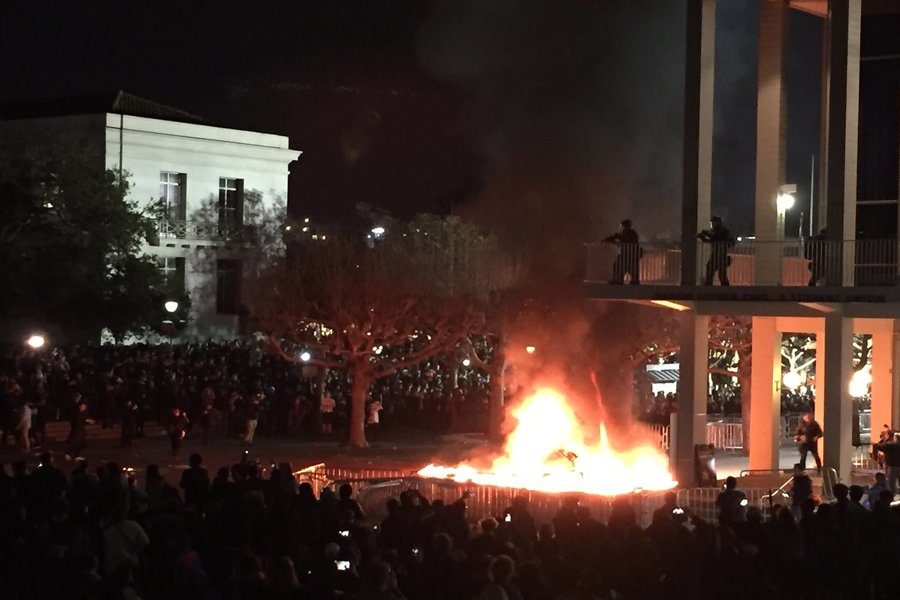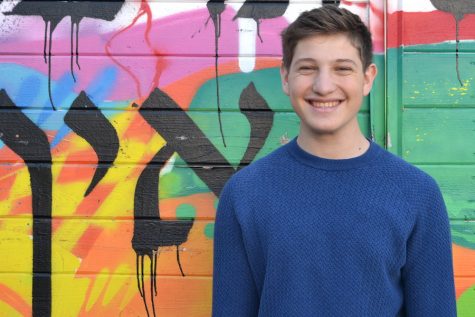Shalhevet alumni at Berkeley decry violence against Yiannopoulous
BP Photo Courtesy of Malcolm Crawford
PROTEST: Joined by 150 outsiders, Berkeley students protested Milo Yiannoupoulous by setting fires and destroying property Feb. 1..
April 9, 2017
Although Shalhevet alumni at UC Berkeley did not agree with Republican personality Milo Yiannopoulos on many issues, they still felt his freedom of speech was denied when a violent protest forced police to cancel his appearance.
A conservative firebrand and former technology editor of the ultra-conservative Breitbart News, Mr. Yiannopoulos was supposed to speak Feb. 1. But a large peaceful demonstration erupted into a riot, police said, when about 150 outsiders joined it and began setting fires and destroying property.
Berkeley freshman and Shalhevet alumnus Avishai Rabin ‘15 was upset that some things on campus were damaged or destroyed.
“I disagree with a lot of stuff that this guy says and I think he’s said really terrible things,” said Avishai, “but that doesn’t warrant that you start throwing fireworks in the Amazon student store.
“The buildings that they destroyed and the tree that was burned down – those are things that we all liked.”
Along with Avishai, two other Shalhevet alumni at Berkeley — Kian Marghzar ’16 and Adam Rokah ’15 — believe the protests also rebuffed Mr. Yiannopoulos’s freedom of speech.
“Freedom of speech was one of the founding concepts of this country, and if you deny a person of that right, then you are more at fault than the other the other person regardless of their beliefs,” said Kian, who did not join in the protests.
Kian would have wanted Yiannopoulos to speak so he could reply back to him.
“I would have wanted to hear him speak to see what he says, so that after he responds, after he speaks, we can respond to what he said,” Kian said.
They were also upset that President Trump seemed to suggest cutting federal funding to the university. Just hours after the protests, the president sent out a tweet to that effect.
Avishai blamed it partly on news media.
“The way that most people at Berkeley feel about it is that it was kind of blown out of proportion by the media,” Avishai said. “Because it wasn’t really Berkeley students that were protesting so much. They were like collecting peacefully and being in a way that was warranted.”
One group rioting named was BAMN, a left-wing group formed to oppose President Donald Trump’s Muslim ban “By Any Means Necessary.” The New York Times said police reported about 150 “agitators” who disrupted the demonstration.
Since he wasn’t able to speak, no one knows what Mr. Yiannopolous would have said. But at previous speeches, he spoke out against gay and transgender individuals – although he is openly gay himself – and made racist slurs against Saturday Night Live star Leslie Jones.
He has also reportedly said that transgender people “are deeply mentally damaged.”
For Adam Rokah, the protest was was the first time he had heard of Milo Yiannopoulos.
“I actually didn’t know who he was until that night, and after all the crazy protests I went and looked up some Youtube videos of him and I kind of understood why Berkeley students wouldn’t respond well to him,” said Adam.
Milo Yiannopoulos’s fame may now have peaked. On Feb. 19 a video was posted on Twitter showing him saying that sex with boys 13 and younger can be a “positive experience” for them, causing the book publisher Simon and Schuster to cancel his book. Mr. Yiannopoulos also resigned his position at Breitbart News, reportedly under pressure.
Before that was known, Kian was already surprised that Berkeley’s Republican club had brought him to Berkeley – though he himself was against the protests.
“I was more shocked at the fact that the Republicans had the nerve, the club of Republicans invited him to speak, knowing what he stands for,” Kian said.
Still, Kian said it was particularly sad that all this happened at Berkeley, home of the free speech movement that began to challenge the Vietnam War in the 1960s.
“The fact that UC Berkeley students themselves denied someone their freedom of speech was something that was a big talk on social media and in classroom,” Kian said.














